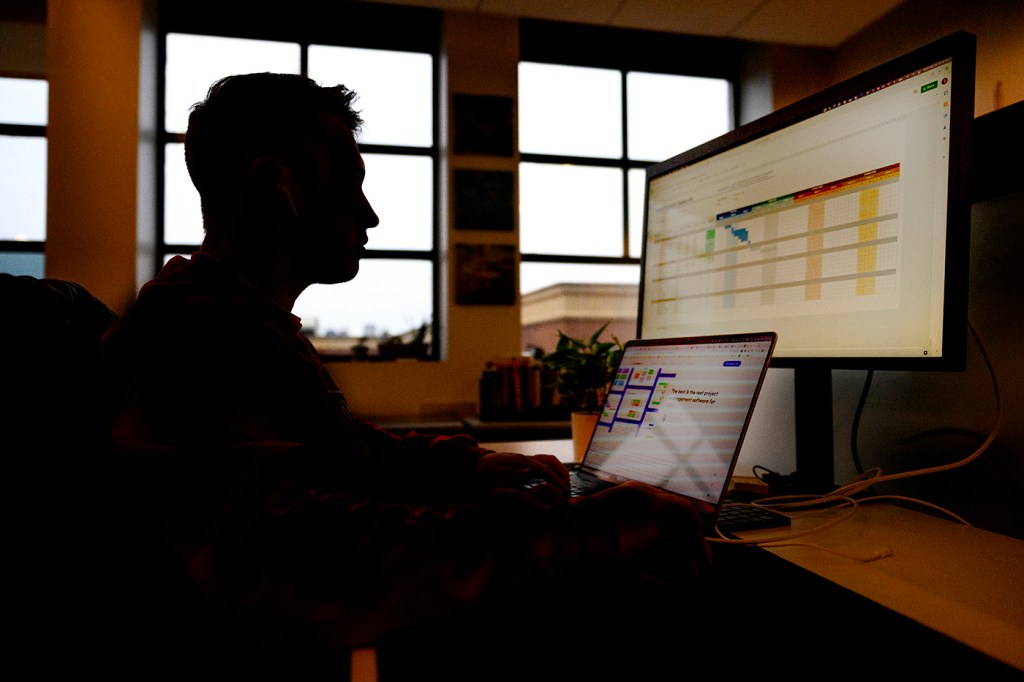People with long COVID-19 are less likely to be employed full time, Northeastern study shows

At 4 a.m. on March 25, 2020, Phillip Baczewski woke up startled. He could no longer catch his breath. He was rushed to the hospital at the start of the COVID-19 pandemic, not knowing if it was the flu, or the unknown virus at the time, that was causing his health scare.
Leaving his family outside, Baczewski was rushed into the intensive care unit, where he was told he had to go on life support—which involved medical procedures to support his breathing—or he could die. Over two weeks later, he woke up from the induced coma to an entirely new life.
It’s been nearly three years since Baczewski tested positive for COVID-19. However, he is still recovering. Symptoms include shortness of breath, fatigue, cognitive dysfunction, depression, anxiety, and difficulty walking from pain in his right foot due to sciatic neuropathy in his right leg.
As he continues to recover, one of the biggest challenges is figuring out how to get healthy enough to return to work.
“We did not know what to do about work,” Baczewski says. “My family needs to get paid.”
A recent research paper titled “Association of Post–COVID-19 Condition Symptoms and Employment Status” aims to answer the question: To what extent is this phenomenon affecting people’s livelihood, and does it affect the nation’s labor markets?
“We have labor shortages right now, and is it a part or partly attributable to long COVID?” asked David Lazer, a co-author of the paper and professor of political science at Northeastern.
The research found that long COVID is correlated with unemployment and not being in the labor force. A correlation means two things are statistically related to each other. Unemployment numbers do not account for those not seeking employment.
The research doesn’t show that long COVID is causing people not to be in the workforce because it could be that they had health issues, for example, that were stopping them from being in the workforce before being infected with the virus.
According to the Centers for Disease Control and Prevention, people with long COVID have a range of new or ongoing symptoms that can last weeks or months after they are infected with the virus that causes COVID-19 and can worsen with physical or mental activity.
Examples of common symptoms of long COVID includes: tiredness or fatigue, difficulty thinking or concentrating (commonly referred to as “brain fog”), shortness of breath, headaches, dizziness on standing, heart palpitations, chest pain, coughing, muscle pain, depression or anxiety or loss of taste or smell.
Using data from the COVID States Project, the research surveyed over 15,000 respondents who tested positive for COVID-19. Out of those surveyed, over 2,000 or 14.6% of respondents reported having long COVID symptoms, including about 46% of those having brain fog or impaired memory.
Of those reporting having long COVID symptoms, 12.3% reported being unemployed, which is higher than those who did not report long-term symptoms at 8.7%.
Around 54% of the overall correspondents worked full time, including 45.5% with long COVID symptoms and 55% without.
The report was the first step in diagnosing and evaluating the potential scope of the issue. But it doesn’t prove that long COVID is reducing the labor market or taking all of these people out of the labor market, Lazer says. However, the paper does show there is a trend in that direction.
Before contracting COVID-19, Baczewski was an adoption social worker for the state Department of Children and Families. A typical workload included handling 20 children in adoption transition, visiting their placement homes, and handling court cases, paperwork and supervision.
It is a job, Baczewski admits, he can no longer do. The thought of climbing stairs or picking up a child is unthinkable.
But, he was denied when he asked for accommodations—such as doing paperwork or supervising children for a few hours. He eventually lost his job and continues to get support from state-funded disability benefits.
“I don’t know if I can go back again to what it is I do,” Baczewski says.
However, Baczewski says, “I want to try. I don’t want to sit around and do nothing. It’s not me. This isn’t what I need—to wake up every day and feel like it’s Groundhog Day.”
Those with long COVID are excited to see research in this space, especially since many feel like the current studies do not do them justice, says Kristin Kostka, director of the Observational Health Data Sciences and Informatics Center Center at the Roux Institute at Northeastern University.
Part of the delay is that data availability typically lags, Kostka says. However, this study, which uses data through July, is timely.
“In general, there is a lot of self-report information in these communities that suggest that they are not materially the same people after they suffer what they believe to be the onset of a long COVID episode,” Kostka says.
“Now we have this mass onslaught of acuity of disease that has made it more visible (but at the same time) doesn’t,” Kostka continued. “They feel like it’s an invisible burden.”
There are laws in the United States that help people with disabilities, such as the Americans with Disabilities Act or state-by-state accessibility laws. Long COVID-19 is protected under the ADA if it substantially limits one or more major life activities.
In general, the United States doesn’t have good workplace protections, Kostka says. She says that Massachusetts Family and Medical Leave Act policy is only 12 weeks of protection. But with some of these symptoms, especially those that affect the nervous system, it could be a lifetime of recovery.
The main thing is to acknowledge long COVID exists, Kostka says. Then, researchers can solve it.
“It’s kind of weird that there’s a problem we don’t want to discuss, right?” Kostka says. “The long COVID patient groups say that millions of people have had COVID at this point. Don’t you think a subset of those people will never be the same?”
Beth Treffeisen is a Northeastern Global News reporter. Email her at b.treffeisen@northeastern.edu. Follow her on Twitter @beth_treffeisen.






